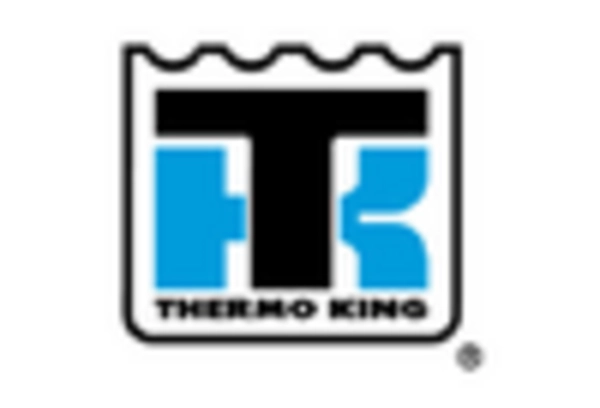Rising E-commerce Activities
The surge in e-commerce activities in the US has led to an increased demand for efficient logistics solutions, particularly in the refrigerated truck-rental market. As consumers increasingly prefer online shopping for perishable goods, businesses are compelled to ensure timely and safe delivery. This trend is reflected in the growth of the e-commerce food sector, which is projected to reach $100 billion by 2025. Consequently, companies are seeking refrigerated truck rentals to maintain the integrity of their products during transit. the refrigerated truck-rental market is experiencing heightened demand as businesses adapt to the evolving landscape of consumer preferences, necessitating reliable transportation solutions for temperature-sensitive items.
Seasonal Demand Fluctuations
Seasonal demand fluctuations in the food industry significantly impact the refrigerated truck-rental market. During peak seasons, such as holidays and summer months, the demand for fresh produce and other perishable items tends to rise sharply. This seasonal surge compels businesses to seek additional refrigerated transport solutions to meet consumer needs. For instance, the demand for fresh fruits and vegetables typically peaks during the summer, leading to increased rentals of refrigerated trucks. The refrigerated truck-rental market is thus characterized by its ability to adapt to these seasonal variations, providing flexible solutions for businesses that require temporary transportation capacity.
Expansion of Food Distribution Networks
The expansion of food distribution networks across the US is a critical driver for the refrigerated truck-rental market. As food producers and distributors seek to reach a broader customer base, the need for efficient transportation of perishable goods becomes paramount. The US food distribution industry is expected to grow at a CAGR of 5% through 2026, indicating a robust demand for refrigerated transport solutions. This growth compels businesses to utilize refrigerated truck rentals to ensure compliance with safety regulations and maintain product quality. The refrigerated truck-rental market is thus positioned to benefit from this expansion, as companies increasingly rely on rental services to meet their logistical needs.
Growth of the Cold Chain Logistics Sector
The growth of the cold chain logistics sector in the US is a pivotal driver for the refrigerated truck-rental market. As the demand for temperature-sensitive products continues to rise, the need for efficient cold chain solutions becomes increasingly critical. The cold chain logistics market is projected to grow at a CAGR of 10% through 2027, indicating a robust expansion in this sector. This growth is likely to result in heightened demand for refrigerated truck rentals, as businesses seek to optimize their supply chains and ensure the safe transport of perishable goods. The refrigerated truck-rental market is thus poised to benefit from the overall expansion of cold chain logistics.
Regulatory Compliance and Food Safety Standards
Stringent regulatory compliance and food safety standards in the US are driving the refrigerated truck-rental market. The Food and Drug Administration (FDA) mandates specific temperature controls for transporting perishable goods, which necessitates the use of specialized vehicles. As businesses strive to adhere to these regulations, the demand for refrigerated truck rentals is likely to increase. Companies that fail to comply with these standards risk facing significant penalties, which further incentivizes the use of rental services that offer reliable temperature-controlled transport. the refrigerated truck-rental market is becoming an essential component of the supply chain for businesses dealing with perishable products.

















